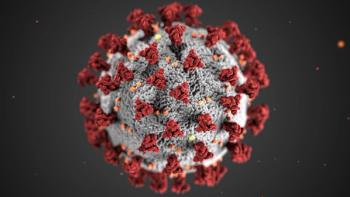
The safety profile of trastuzumab deruxtecan in the phase 3 DESTINY-Gastric04 trial was consistent with the established safety profile of the agent.

Your AI-Trained Oncology Knowledge Connection!


The safety profile of trastuzumab deruxtecan in the phase 3 DESTINY-Gastric04 trial was consistent with the established safety profile of the agent.

A patient case of a 50-year-old man with hormone-sensitive prostate cancer sparked a debate among oncologists regarding the best course of action.

The observed safety profile of HA121-28 was similar to that of other multi-targeted RET tyrosine kinase inhibitors.

Julie M. Vose, MD, MBA, discusses some of the lasting effects that the COVID-19 pandemic has had on the current state of cancer care.

AI-powered pathology imaging enables a more comprehensive assessment of tumor microenvironments than humans alone could perceive.

Combining pembrolizumab with pemetrexed met the primary end point of objective response rate in a phase 2 trial.

Retrospective analyses found that antihistamines added to atezolizumab yielded a 46% OS rate, a 48% CSS rate, and a 23% PFS rate in patients with metastatic urothelial carcinoma.

The Oncology Decoded podcast highlighted the impact of the results from the NIAGARA trial for patients with bladder cancer in a post-ASCO GU discussion.

Data from the RATIONALE-306 trial support the approval of tislelizumab plus chemotherapy in unresectable or metastatic esophageal squamous cell carcinoma.

A real-world study assessed treatment patterns and outcomes of elderly patients with lenalidomide-refractory multiple myeloma after 1 to 3 therapy lines.

Daratumumab would become the sole anti-CD38 agent available for all newly diagnosed multiple myeloma types if approved.

A retrospective cohort study found that, of Medicare decedents with advanced cancer, 45% experienced potentially aggressive end-of-life care.

Data from the DESTINY-Breast06 trial support the positive opinion on trastuzumab deruxtecan as a treatment in HER2-low or HER2-ultralow breast cancer.

Pirtobrutinib demonstrated PFS benefit compared with standard of care in patients with relapsed or refractory CLL in the BRUIN CLL-321 trial.

Antitumor efficacy end points favored placebo over trilaciclib prior to FOLFOXIRI/bevacizumab in patients with untreated metastatic colorectal cancer.

One of the most predictable toxicities of autologous stem cell transplantation for multiple myeloma — even more so than mucositis — is hair loss.

Overall, BMT CTN 0702 showed no improvement in outcomes with added post-ASCT consolidation as compared to standard lenalidomide maintenance.

The absence of a PFS and OS benefit in the transplant arm was consistent across key subgroups in the phase 3 GMMG ReLApsE trial.

In a small cohort of patients with MMS/pMMR CRC, the suvemcitug and envafolimab pharmacokinetic profiles were comparable with prior monotherapy studies.

Pembrolizumab and bevacizumab yielded an ORR of 58.3% vs 12.5% with pembrolizumab monotherapy in patients with platinum-resistant nasopharyngeal carcinoma.

Pathologic complete response rates with the atezolizumab combination were higher for patients with PD-L1–negative disease in the phase 2 ATHENE trial.

AUTO4 CAR T cells plus fludarabine and cyclophosphamide was well tolerated in patients with relapsed or refractory peripheral T cell lymphoma.

Daratumumab plus lenalidomide/dexamethasone for multiple myeloma showed improved 5-year health-related quality of life vs lenalidomide/dexamethasone alone.

Data highlight a need for randomized clinical trials to compare the efficacy and safety of VRD vs VTD in transplant-eligible multiple myeloma.

Data from the phase 3 STARGLO study support the CHMP’s recommendation for approving glofitamab plus gemcitabine/oxaliplatin in relapsed/refractory DLBCL.

Phase 2 study results revealed NP-G2-044 plus standard of care anti–PD-1 therapy indicated treatment exhibited responses across at least 7 cancer types.

Despite prior relapses, 200 mg of linvoseltamab elicited complete responses or better in 49.6% of patients with relapsed/refractory multiple myeloma.

Both clinicians and patients should have as much information as possible to participate in shared decision-making for CLL care, says Jacob D. Soumerai, MD.

Phase 2 data support the use of a modified quadruplet regimen omitting dexamethasone after 2 cycles in elderly transplant-ineligible multiple myeloma.

After treatment with an aromatase inhibitor plus a CDK4/6 inhibitor, switching to camizestrant plus a CDK4/6 inhibitor showed a PFS benefit over remaining on the aromatase inhibitor.